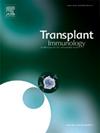Racial and ethnic disparities in kidney transplantation
IF 1.4
4区 医学
Q4 IMMUNOLOGY
引用次数: 0
Abstract
Social determinants of health, bias and genetic predisposition contribute to racial inequities in chronic kidney disease (CKD) and kidney transplant (KTX) allocation. Recognizing and addressing these complex factors leads to improvement in outcomes. This narrative review aims to discuss the current state of racial disparities surrounding KTX and identify where future efforts should be concentrated. The discussion focuses on data from the past 10 years (2015–2025). Overall mortality and graft loss is lowest in Hispanics and Asians and highest in Native Americans, perhaps due to the unique protective or detrimental social factors in these populations. Blacks have equal to better mortality than Whites, but worse graft survival. In an effort to identify paucities in the current literature, KTX outcomes by specific CKD etiologies are reviewed, including: diabetic nephropathy, focal segmental glomerulosclerosis, membranous nephropathy, lupus nephritis, vasculitis and polycystic kidney disease. Graft survival and mortality patterns for disease specific kidney transplant generally mirrors that of all cause KTX, but available data is limited. In recent years, racial disparities in CKD and transplant have improved, but still persist, representing the need for continued investigation and improvement. Future work should focus on continued identification and implementation of successful mitigation strategies and investigation where current literature is insufficient, such as diabetic nephropathy.
肾移植中的种族差异。
健康、偏见和遗传易感性的社会决定因素导致慢性肾脏疾病(CKD)和肾脏移植(KTX)分配中的种族不平等。认识和处理这些复杂的因素会导致结果的改善。这篇叙述性评论旨在讨论围绕KTX的种族差异的现状,并确定未来的努力应该集中在哪里。讨论的重点是过去10年 年(2015-2025)的数据。西班牙裔和亚洲人的总体死亡率和移植物损失最低,而美洲原住民最高,这可能是由于这些人群中独特的保护性或有害的社会因素。黑人的死亡率比白人高,但存活率却比白人差。为了找出目前文献中的不足之处,我们回顾了特定CKD病因的KTX结果,包括:糖尿病肾病、局灶节段性肾小球硬化、膜性肾病、狼疮性肾炎、血管炎和多囊肾病。特定疾病肾移植的移植物存活和死亡率模式通常反映了全因KTX,但可用的数据有限。近年来,CKD和移植中的种族差异有所改善,但仍然存在,这表明需要继续调查和改进。未来的工作应侧重于继续确定和实施成功的缓解策略,并调查目前文献不足的领域,如糖尿病肾病。
本文章由计算机程序翻译,如有差异,请以英文原文为准。
求助全文
约1分钟内获得全文
求助全文
来源期刊

Transplant immunology
医学-免疫学
CiteScore
2.10
自引率
13.30%
发文量
198
审稿时长
48 days
期刊介绍:
Transplant Immunology will publish up-to-date information on all aspects of the broad field it encompasses. The journal will be directed at (basic) scientists, tissue typers, transplant physicians and surgeons, and research and data on all immunological aspects of organ-, tissue- and (haematopoietic) stem cell transplantation are of potential interest to the readers of Transplant Immunology. Original papers, Review articles and Hypotheses will be considered for publication and submitted manuscripts will be rapidly peer-reviewed and published. They will be judged on the basis of scientific merit, originality, timeliness and quality.
 求助内容:
求助内容: 应助结果提醒方式:
应助结果提醒方式:


